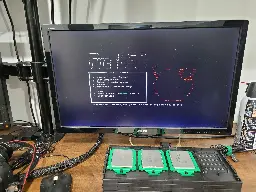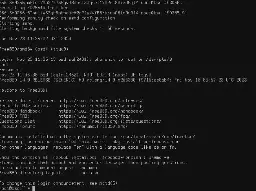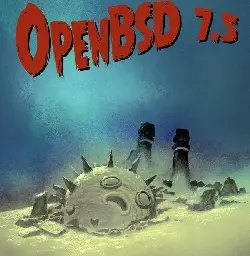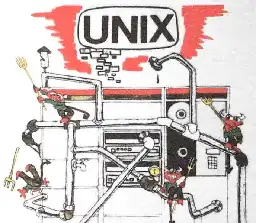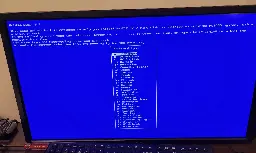BSD
- FreeBSD At 30: The History And Future Of The Most Popular BSD-Based OShackaday.com FreeBSD At 30: The History And Future Of The Most Popular BSD-Based OS
Probably not too many people around the world celebrated November 1st, 2023, but on this momentous date FreeBSD celebrated its 30th birthday. As the first original fork of the first complete and op…

- Version 7.6 – the 'OpenBSD of Theseus' – released [The Register]www.theregister.com Version 7.6 – the 'OpenBSD of Theseus' – released
Ideal for black-clad ultra-minimalist types. You probably wouldn't like it
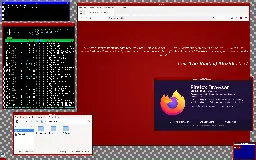
- Why laptop support, why now: FreeBSD’s strategic move toward broader adoptionfreebsdfoundation.org Why laptop support, why now: FreeBSD’s strategic move toward broader adoption | FreeBSD Foundation
FreeBSD has long been a top choice for IT professionals and organizations focused on servers and networking, and it is known for its unmatched stability, performance, and security. However, as technology evolves, FreeBSD faces a significant challenge: supporting modern laptops. To address this, the ...
- FreeBSD 13.4-RELEASE Announcementwww.freebsd.org FreeBSD 13.4-RELEASE Announcement
FreeBSD is an operating system used to power modern servers, desktops, and embedded platforms.
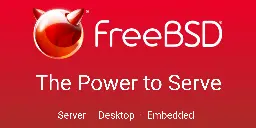
- Sovereign Tech Fund Invests in FreeBSD to Boost Securitywww.darkreading.com Sovereign Tech Fund Invests in FreeBSD to Boost Security
The funds from Germany’s Sovereign Tech Fund will be used to integrate security features such as zero trust capabilities and tools for software bill of materials.

- BSD Jumpstart - Website with an overview of each BSD systemwww.bsdjumpstart.org BSD Jumpstart
A comprehensive guide to NetBSD, FreeBSD, OpenBSD, and DragonFlyBSD
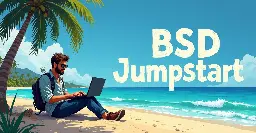
- How could I get started with BSD?
hello,
I want to learn and deep dive into BSD systems. I am a Linux user for more than 3 years and now I am curious to learn and use BSD since BSD is similar to Linux and has binary compatibility.
sadly my laptop wifi card isn't supported by any BSD systems. so I can't use it as my daily driver. so where should I go or do to learn more about BSD?
- I am sad to report that Mike Karels died on the way home from #BSDCan, at the age of 67www.facebook.com BSDCan | I am sad to report that Mike Karels died on the way home from #BSDCan, at the age of 67 | Facebook
I am sad to report that Mike Karels died on the way home from #BSDCan, at the age of 67. https://www.gearty-delmore.com/obituaries/michael-mike-karels This man spent 40 years working on BSD. His...
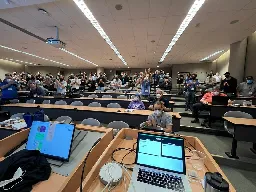
- NetBSD 10.0 available
The NetBSD project is pleased to announce the eighteenth major release of the NetBSD operating system NetBSD 10.0! See the release announcement for details.
- OS Recommendations for 2014 MacBook Pro
cross-posted from: https://lemmy.ca/post/16157561
My grandma just gave me her old MacBook Pro (MacBookPro11,1 A1502) and, after removing a spicy pillow, air dusting everything, and copying off her old photos, I'm ready to do a clean install.
I would like to dual-boot either Linux or BSD (which will be my main partition) alongside macOS (which will be handy for testing and for use with certain peripherals; either Mavericks, High Sierra, or Big Sur).
I am already well-versed in unix-like operating systems, so I'll only start having trouble if I try to use a source-based distro (e.g. Gentoo, Source Mage, LFS, etc.)
Can I have some recommendations for the Linux and the macOS version, please?
EDIT: For clarity, I do NOT want to use a source-based distro unless it would be particularly fast on this machine.
- NetBSD 10.0 RC4 available
The NetBSD project is pleased to announce the fourth (and probably last) release candidate of the upcoming 10.0 release, please help testing! See the release announcement for details.
- NetBSD 10.0 RC3 available
For RC3 only few (relatively) minor changes were made, including https certificate verification in libfetch (which is used by pkg_ad(1)), and also improvements to the EFI bootloader to better deal with booting from CD (or in virtual machines ISO images), plus lots of various bug fixes.
- NetBSD 10.0 RC2 available
The NetBSD project is pleased to announce the second (and probably last) release candidate of the upcoming 10.0 release, please help testing! See the release announcement for details.
The netbsd-10 release branch is more than a year old now, so it is high time the 10.0 release makes it to the front stage. This matches the long time it took for the development branch to get ready for branching, a lot of development went into this new release.
This also caused the release announcement to be one of the longest we ever did.
- FreeBSD 14.0-RELEASE Announcementwww.freebsd.org FreeBSD 14.0-RELEASE Announcement
FreeBSD is an operating system used to power modern servers, desktops, and embedded platforms.
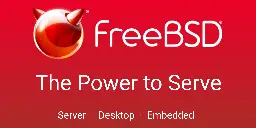
- NetBSD 10.0 timeline and branch status
after some unusual rough days for the netbsd-10 branch last week, we now have a state that is building fine again and all tests look as expected. We also made great progress on the icky DRM/KMS issues and overal stability.
The tricky pullups are done (thanks to everyone who helped with it), and package builds are going - so now it looks like we will be able to switch from BETA to release candidate state soonish.
See https://wiki.netbsd.org/releng/netbsd-10/
for the current list of bad bugs we are facing and the amount we dealt with already. Quite a lot of the DRM/KMS releated ones are in feedback state and have just been pinged - hopefully more of them will be closed soonish.
Realistically this is close to as good as we will get the branch for a 10.0 release - so we are now looking at a release date very early in october.
- FreeBSD Status Report Q2www.freebsd.org FreeBSD Status Report Second Quarter 2023
FreeBSD is an operating system used to power modern servers, desktops, and embedded platforms.
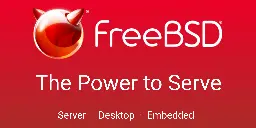
The FreeBSD foundation has made significant progress in contacting commercial FBSD users. They also wish for FreeBSD to have better tier 1 cloud support, and better documentation on Azure (the latter sponsored by Microsoft, may be good or bad).
Netflix (out of all companies) sponsors FreeBSD support of LinuxBoot, which is a boot firmware, that in fact, boots Linux (in case you didn't know). The FBSD developers currently need help with the following things (taken directly from site):
- loader.kboot(8) needs to be written. It should document how to use loader.kboot, how to create images, and the use cases that work today.
- Finish amd64 support.
- The current elf arch-specific metadata code is copied from efi. Unifying the kboot and efi copies is needed. While they are mostly the same, sharing is complicated by remaining compile-time differences. In addition, the build infrastructure makes sharing awkward.
- It would be nice to add riscv64 support.
- PowerPC testing (it has been untested since the refactoring started).
- Creating a script to repackage EDK-II image (say, from QEMU) as a linux-boot image with a Linux kernel built on FreeBSD for CI testing.
- Testing it from the coreboot LinuxBoot.
The Custer Administration Team has seemingly been successfull at finding mirrors (companies have provided hardware, however it has not been specified whether they are mirrors on the site), however, they still require a full mirror site with 5 servers within Europe specifically.
With the Honeyguide Group sponsoring, the FBSD team plans to make jails more akin to Docker images. Pot will be the FBSD equivalent of Dockerhub. This will be great for the development of FBSD, since Docker is a must-have feature for many developers.
Wazuh is an open source platform, which is used for threat prevention, detection, and response. The main goal is to make FreeBSD more visible as a cybersecurity platform. You can contribute if you wish.
All in all, many developments are being made in FBSD, and I think it may interest you to take a look.
- BSD Innovations
The BSDs have made quite a few innovations over the years. Many of them have not only made it to Linux, they have made it to Windows and MacOS as well. You might find this page on OpenBSD's website quite interesting! :)
- Six New Security Advisoriers: NetBSD-SA2023-00[1-6]
- NetBSD-SA2023-006 KDC-spoofing in pam_krb5
- NetBSD-SA2023-005 su(1) bypass via pam_ksu(8)
- NetBSD-SA2023-004 procfs environ exposure
- NetBSD-SA2023-003 Structure padding memory disclosures
- NetBSD-SA2023-002 Various compatibility syscall memory access issues
- NetBSD-SA2023-001 Multiple buffer overflows in USB drivers-----
- BSD vs Linux wars
Synopsis
Do you think BSD, or Linux is better? Which of the BSDs do you think are the best?
Let's start a war!
- FreeBSD Status Report Q1-2023www.freebsd.org FreeBSD Status Report First Quarter 2023
FreeBSD is an operating system used to power modern servers, desktops, and embedded platforms.
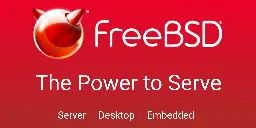
This is the FreeBSD status report for the first quarter. It describes many operating system improvements, along with efforts on promoting FBSD. The FreeBSD foundation sponsors many events, which include tech conventions. Currently, the cluster administration team are looking for new mirror sites; If you know anyone, or are someone, who could host such sites, within certain countries, they wish to get in touch. The teams at FreeBSD also need help with various other things, such as translation, Freshports, and general feedback/patches.
I want to see your thoughts below. I think the discussion will be quite interesting! :)
- BSD Overview, and Resources
Salutations, and welcome to the BSD community of programming.dev!
The BSDs are a family of operating systems that derive from the original Berkeley Software Distribution. They are UNIX like, therefore much of the same software that is on Linux, can be found on the BSDs (including the shell).
The three main BSDs that are currently being maintained are FreeBSD, NetBSD, and OpenBSD.
FreeBSD: > https://www.freebsd.org/
FreeBSD is what I think is the general-purpose BSD. FreeBSD comes with many useful tools out of the box (particularly for SysAdmins), along with a very handy dandy manual (handbook). The handbook details the install process, along with many tools that come out of the box. The tools include: Clang (C++ compiler), Bhyve (hypervisor), Jails (docker alternative), networking tools, ETC. A more comprehensive list can be found here: https://www.freebsd.org/applications/.
OpenBSD: > https://www.openbsd.org/
The same team that curated OpenSSH, presents OpenBSD. The folks behind OpenBSD are far more security-minded. Their methods of security are described here: https://www.openbsd.org/security.html. Due to increased security, users may notice a drop in performance compared with Linux, or the other BSDs. However, it may be worth the benefit within more secure environments. OpenBSD also puts a focus on cryptography, along with portability, correctness, and standardization.
NetBSD: > https://www.netbsd.org/
I consider NetBSD to be the hobbyist BSD. You can run this thing on anything from a yellowed-out Dreamcast from a century ago, to your ordinary x86_64 supercomputer. It is also fast. Therefore, your average home toaster has a chance at browsing the internet in the modern day. Just make sure to bring a fire extinguisher, before you enable JavaScript ;). Besides being a toaster's lord and savior, it is also easy to modify NetBSD's source code (You can also do it with the other three). NetBSD has been used as a teaching source for operating system development. It may be a smaller project than the other two, but I believe it is worth having a look at.
All three of these BSDs have their own personality, and I believe getting to know them better will make you a better programmer. They have a lot to offer on the table, and I hope all of you who stumble upon this page will give them a fighting chance! :)
